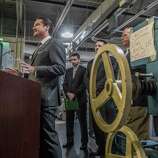 https://www.timesunion.com/business/article/Forbes-story-ranks-Capital-Region-seventh-among-12944571.php
https://www.timesunion.com/business/article/Forbes-story-ranks-Capital-Region-seventh-among-12944571.php
Forbes story ranks Capital Region seventh among flourishing manufacturing cities
Updated 5:07 pm, Friday, May 25, 2018
The Capital Region ranks seventh among large U.S. metropolitan areas where manufacturing is thriving, according to a Forbes article by two scholars.
Joel Kotkin, a fellow in urban futures at Chapman University, and Michael Shires, a professor of public policy at Pepperdine University, examined manufacturing jobs in more than 300 metropolitan statistical areas and various trends beginning in 2006. They based their rankings on data from the U.S. Bureau of Labor Statistics.
"Over the past eight years manufacturing has bounced back strongly from the crater the sector fell in during the Great Recession, gaining 1.1 million jobs," they wrote in the Forbes piece. "A broad array of places across the U.S. are benefiting."
The Albany-Schenectady-Troy metro area came in seventh. Buffalo-Cheektowaga-Niagara Falls ranked 56 and Rochester ranked 66.
More than 26,000 people work in the manufacturing sector locally, though the number of jobs in the industry fell by 4,700 betwween April 2017 and April 2018, according to federal data.
The sector has experienced "significant growth" locally among companies of all sizes, ranging from traditional to cutting edge, said Capital Region Chamber president Mark Eagan.
"It's proof that manufacturing is alive and well in our region," he said.
He noted that some businesses have automated different jobs and tasks and may not correspond to "the image of manufacturing" people have in their mind.
Manufacturers in the Capital Region have struggled to find workers with the skills they need and demand for "middle skills" like knowing how to read a blueprint is growing, according to a 2017 study by the Center for Economic Growth.
The organization recently partnered with the state Manufacturers Association to launch a new apprenticeship program. Participants will be trained to fill in gaps in the high-skill trades left by workers who are retiring.
"The apprenticeship programs that trained the current manufacturing workforce are not being utilized as efficiently for the next generation of workers," CEG president and CEO Andrew Kennedy said in a statement in March.
This presents issues for small and mid-sized manufacturers because "it is just too burdensome for many of them to take on apprentices by themselves, but by not doing so they also endanger their talent pipeline," he added. The new venture will "ease the burden for manufacturers and keep the talent flowing in the Capital Region."




